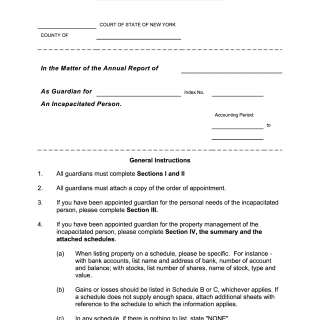Annual Guardianship Report
An Annual Guardianship Report is a legal document that provides an update on the care, well-being, and financial management of a minor or incapacitated adult under guardianship. This report is required to be filed annually with the court by the guardian, who is responsible for the care of the individual.
The main purpose of the Annual Guardianship Report is to ensure that the interests of the individual under guardianship are being protected and that the guardian is fulfilling their responsibilities. The report consists of various parts, including a summary of the individual's current health and living situation, a financial accounting of the individual's assets, and a description of any major changes in the individual's life since the previous report.
The parties involved in this form are the guardian, the individual under guardianship, and the court. It is important to consider the level of detail and accuracy when writing this report, as it will be reviewed by the court to ensure that the individual's interests are being protected.
When writing this report, the guardian will need to provide detailed information about the individual's current living situation, including their health, education, and overall well-being. They will also need to provide a detailed accounting of the individual's assets and expenses, including any income or expenditures on their behalf. Additional documents may need to be attached, such as medical records, financial statements, and receipts for expenses.
An application example for this report would be a guardian of a minor child who was appointed by the court to manage the child's affairs. The guardian would need to file an Annual Guardianship Report with the court each year to provide an update on the child's well-being and financial management.
Strengths of this form include its ability to ensure that the interests of the individual under guardianship are being protected and that the guardian is fulfilling their responsibilities. Weaknesses may include the potential for errors or omissions if the guardian does not provide complete and accurate information.
Alternative forms or analogues to this form may include periodic reviews or assessments of the individual under guardianship by a court-appointed evaluator or investigator. The difference is that these evaluations are conducted by a third party and may be less frequent than the annual report required by the guardian.
The information provided in this report may affect the future of the participants, as the court may use it to make decisions about the individual's care and well-being. The report is submitted to the court and is stored in the individual's court file.

